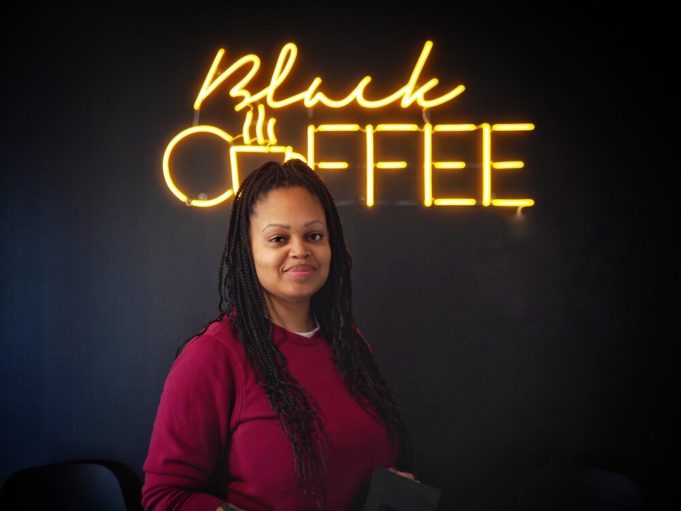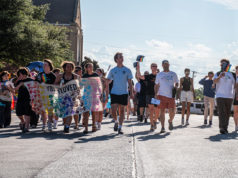Stop Six was already facing a shortage of living-wage jobs and commercial development when the COVID-19 pandemic swept through, forcing layoffs and sending thousands of children to homes with limited resources.
Quinton Phillips remembers the day the Fort Worth school district released 84,000 students as the district closed its campuses.
“That was the first sign things were going to get tough,” the school district trustee said. “Schools mean a lot [to the Stop Six neighborhood] from a childcare and nutritional perspective. That began to affect everything. Parents had to make tough decisions on whether to let young people stay at home rather than miss work.”
The shuttering of classes came at a particularly bad time, Phillips said. In early March, a malware attack crippled the district’s central computer system. Now, district administrators and staff had to revive the network while allocating tablets or other media devices to every public school student. Teachers in elementary middle, and high schools began developing an online curriculum from scratch.
“Even if the student had a device, they may not have access to Wi-Fi,” Phillips said. “The teachers and administrators worked around the clock to roll the online program out in phases. Now, people can get online and have contact with their teachers. As a school board, we voted to give 3,100 additional devices and 6,000 hotspots to make sure [students] had some kind of Wi-Fi capability.”
To ensure that individual families are keeping up with the new programs, Phillips said principals and teachers across Fort Worth are touching base with parents on a weekly basis.
As that crisis began to stabilize, Phillips turned his attention to his home neighborhood of Stop Six. The cofounder of the nonprofit CommUnity Frontline, with the help of other CommUnity Frontline members, is organizing online mental health forums, doing grocery runs for elderly residents, volunteering at food pantries, and raising funds to help unemployed men and women find some level of stability during the economic crisis.
“We were hit hard,” he said. “On the East Side, we already had a deficiency of jobs. Stress levels are at an all-time high. We are hearing about spikes in domestic violence. There’s a saying, ‘When the nation catches a cold, the black community gets pneumonia.’ ”
For a sense of how the Eastside small-business community was coping with the economic downturn, Phillips recommended that I reach out to Black Coffee owner Mia Moss.
Just five months after opening near Texas Wesleyan University, Black Coffee continues to serve hot java and light bites to Eastside residents through curbside pickups on weekends. Moss built her coffee shop to serve the local community, she said. Black Coffee regularly hosts community meetings.
Moss was able to keep her three baristas on staff with the help of donations. Business is down 70 percent, she said. Before the coronavirus pandemic, her small business was still growing its client base and had yet to turn a profit.
“With us being on the East Side, it’s harder,” she said. “There are more people getting to-go orders on the other side of town. I’m staying hopeful, just trying to make it through.”
Gov. Greg Abbott’s recent announcement that Texas businesses will begin a series of phased openings offers the prospect of renewed income, but Moss said she “still has to make sure her staff and everyone is healthy.”
After five months of working overtime to grow a small business, reopening after the COVID-19 pandemic will be “like opening all over again,” she said.
Amid the economic crisis, a bit of good news is coming to the Stop Six community. The U.S. Department of Housing and Urban Development (HUD) recently announced that the City of Fort Worth and Fort Worth Housing Solutions will receive “$35 million to redevelop the Cavile Place public housing complex and the Stop Six neighborhood.”
The funds will enable 300 public housing units at Cavile Place to be replaced with 990 mixed-income rental units. Mayor Betsy Price, in a public statement, said that she is “thrilled to receive this wonderful news because Stop Six is such a special neighborhood with a distinctive and vibrant history worth preserving.”
Without providing specifics, the media alert added that the federal funds are “expected to leverage $345 million in additional funding for neighborhood reinvestment.”
Phillips said he has been in close contact with local elected officials who are “trying to deliver the most help to the most people during the crisis. There have been many groups showing leadership and stepping up. The Boys and Girls Club, Tarrant Area Food Bank, churches, and the school district are feeding people. It has been a community effort.”
Phillips sees an urgent need to provide free or affordable COVID-19 tests. He worries that when tests do become readily available, they will be distributed in Fort Worth’s urban core and not in poorer communities.
How long can Stop Six hold out?
“I look at our community as indestructible in many ways because we already had to deal with poverty,” he said. “We can rise through anything, but that does not mean that there won’t be consequences or a loss of life. How long will we last? As long as it takes. The church community and volunteers are stepping up. We can last, but that doesn’t mean that we need to be neglected in the meantime.”












